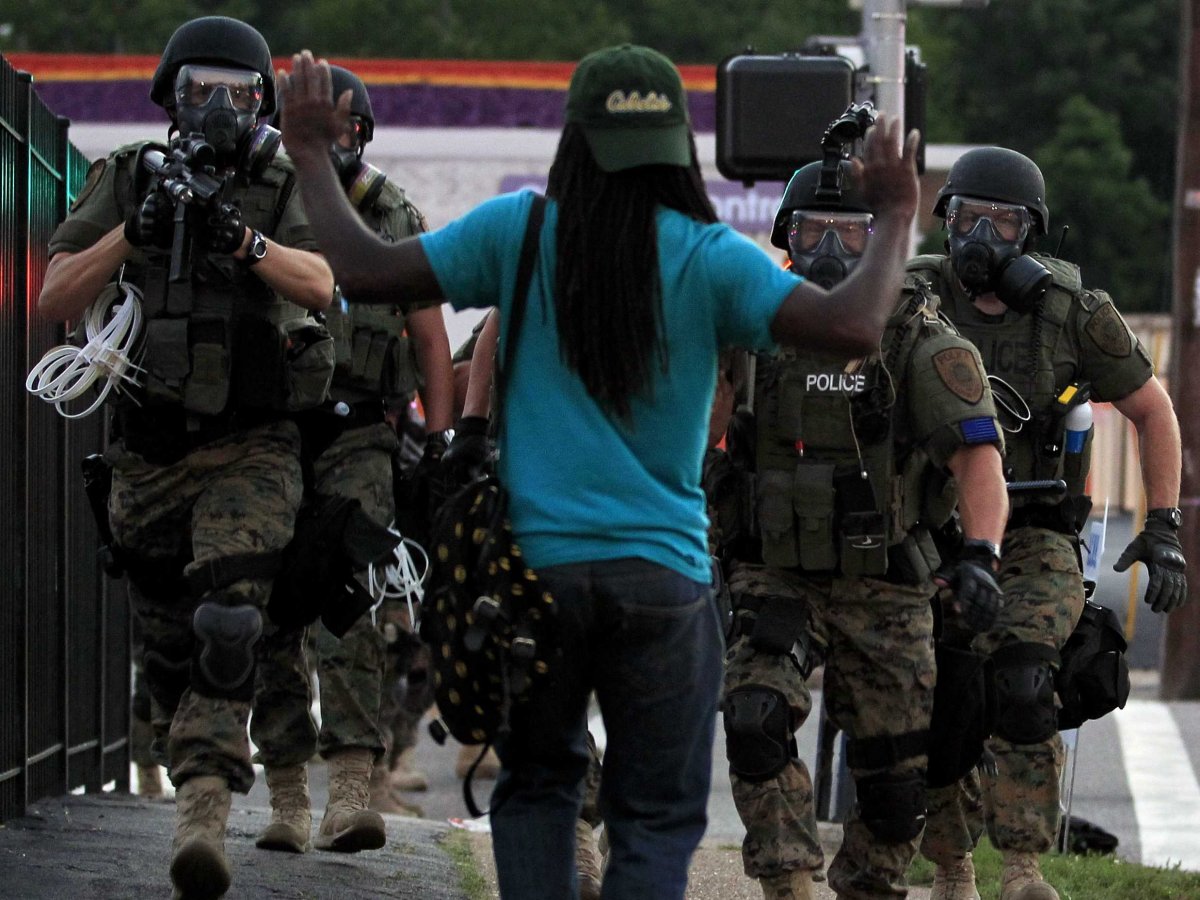I was born in 1971, too late to have witnessed the convulsive events that characterized the end of the 1960s. I know of the 1968 Democratic Convention in Chicago from reading about it and seeing old news footage. The massacre at Kent State I knew chiefly through the song Neil Young wrote about it. I always wondered what it must have been like to live through that, to see our country turning on itself like a snake swallowing its own tail, and ask, “What’s happening to us?”.
I’ve been following the story of Ferguson, Missouri, and the riots and unrest that have followed in the wake of the death of Michael Brown. And I think, maybe, I get it now.
The pictures that have emerged from Ferguson are the most shameful images I have seen of American life since our first glimpses of the Lower Ninth Ward in New Orleans, after Hurricane Katrina drowned it. If you can look at images of a garishly militarized police force training assault weapons on unarmed American civilians, and not feel some mixture of horror, outrage and despair, I really don’t know what to make of you. This is exactly the kind of thing that, we used to tell ourselves — accurately, for the most part — only happened in other countries.
It’s true that there has been rioting in Ferguson, and at least a possibility that police officers were threatened by people in the crowd. And none of that — neither threats nor rioting nor anything else — justifies the grotesque display of paramilitary zeal that ensued. A police force that properly remembered its mission to serve its community would have gone into this situation with the goal of defusing it, of letting tensions bleed off and subside. The Ferguson police seem to have made the opposite decision: to meet force with force.
Here is what Jelani Cobb wrote in the New Yorker:
What transpired in the streets appeared to be a kind of municipal version of shock and awe; the first wave of flash grenades and tear gas had played as a prelude to the appearance of an unusually large armored vehicle, carrying a military-style rifle mounted on a tripod. The message of all of this was something beyond the mere maintenance of law and order: it’s difficult to imagine how armored officers with what looked like a mobile military sniper’s nest could quell the anxieties of a community outraged by allegations regarding the excessive use of force. It revealed itself as a raw matter of public intimidation.
It’s important to bear in mind that there is another, equally important objection to the conduct of the Ferguson police. Beyond being grossly excessive, it was incompetent. They could hardly have made the situation worse if they tried. It’s staggering to think that no one in a position of authority in that town thought to wonder, given a populace severely on edge from what they considered an unjust use of police force, whether suiting up the police in riot gear and sending them into the streets in military-surplus armored vehicles with roof-mounted machine guns might be, you know, misconstrued. As Matthew Yglesias wrote, “you do crowd control with horses, batons, and shields, not rifles. You point guns at dangerous, violent criminals, not people out for a march.” The law-abiding people of Ferguson were done a terrible disservice by the people sworn to protect and serve them. And you needn’t take my word for it, as a cursory glance at the Storify page Veterans on Ferguson reveals. A few of the more on-point comments:
In the USAF, we did crowd control and riot training every year. Lesson 1: Your mere presence has the potential to escalate the situation.
Also, we contained riots in Baghdad next to mosques with less violence than the police are employing.
A lot of vets, me included, would go to Ferguson and gladly teach some classes on crowd control and patrolling[.] You are fucking it up.
I do not write this from any kind of anti-police animus. I’ve relied on help from the police several times in my life and was grateful each time; civil society could not function without them. By the same token, I do not recognize the generous, selfless police officers I’ve encountered in these images from Ferguson, and I’m confident that were I a police officer myself, I’d be every bit as appalled by what has occurred.
As of this writing, it appears cooler heads are starting to prevail. The Missouri State Police have taken charge of the situation, and its captain has taken the radical step of opening a dialogue with Ferguson citizens to begin to undo the damage of the last four days. I am relieved. Maybe Ferguson will escape its name being inscribed alongside Kent State and Chicago on the list of the grossest abuses of state power in America. And maybe, as the dust settles and we begin to take stock of what’s happened, we can have a long-overdue conversation on the wisdom of arming local police forces like platoons of Marines. And, of course, there is the matter of Michael Brown: how he died, why he died, and what could have been done to prevent it.
So many conversations to have. Just so long as we do have them, that all this might not be for naught.
